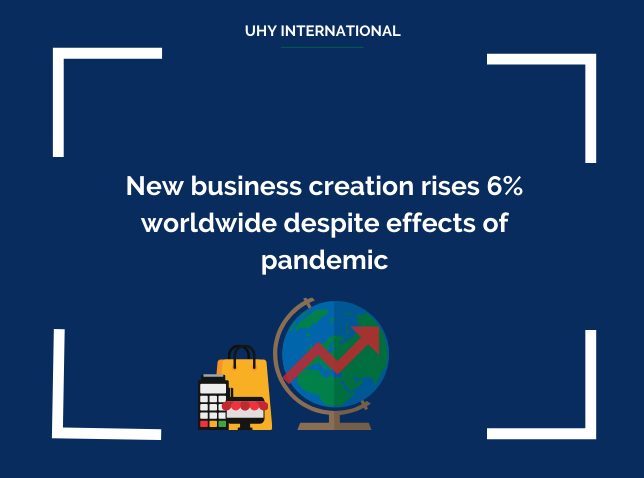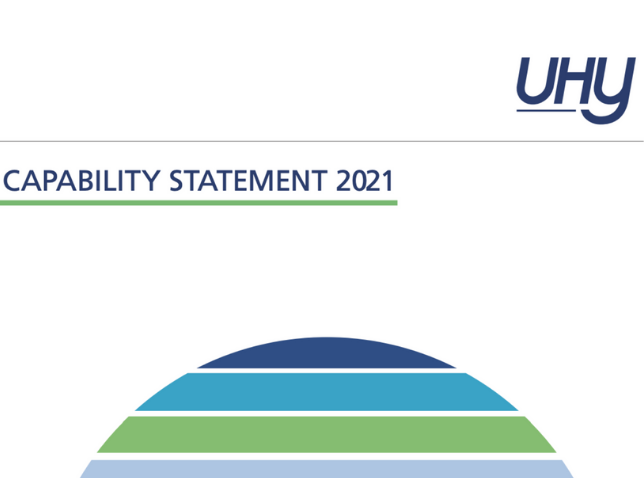UHY International: Can AI make us better?

This post is also available in: Français (French)
Issued January 18 2019
Published by UHY Victor LLP
From home assistants like Alexa to apps like Uber, artificial intelligence is already making our lives more convenient. But beyond lifestyle gains, can it be harnessed to help overcome bigger challenges for the benefit of all?
At the 2018 Google I/O conference Sundar Pichai, CEO of Google Inc., stated: “We are at an important inflexion point in computing,” adding that while it was an exciting time to be driving new technology, “it has made us more reflective about our responsibilities.”
He went on to reflect on a trend that is shaping how hi-tech’s big players are approaching the development of new technologies, where innovation for the benefit of society is key. Just as Google is keen to stress how artificial intelligence (AI) has the potential to positively impact healthcare, so its competitors are also showing a benevolent face: IBM launched its Science for Social Good programme in 2017, while Microsoft’s ‘AI for good’ declares its commitment to positively impact the environment, education and healthcare.
Whether or not the tech giants’ motives are truly benevolent, many believe that AI can be harnessed for the common good. The first AI for Global Good Summit was held in 2017, bringing together United Nations (UN) agencies, government officials, industry leaders and AI experts to discuss how AI solutions could address global challenges; at the 2018 Summit AI and digital technologies were identified as vital in achieving the UN’s Strategic Development Goals (SDGs).
Can AI really help to make the world a better place? And if so, how?
From small seeds
Beth Schulte, principal at UHY Advisors MO in St Louis, United States, has worked extensively in the technology space, as well as being a mentor for one of the most highly ranked accelerator programmes in the US. “While big players like Google have a lot of money to invest, the ideas and innovation driving tech often come from young innovators,” she says. “Building on grassroots ideas with a strong team, they go on to be acquired by an organisation with the resources to expand it.”
Beth continues: “Many of the large corporations have an innovation arm, but they might also look to acquire small entities or start-ups and build on their technology. For this reason, whenever I start working with an entrepreneur in the tech space, I always ask what their exit strategy is.”
DeepMind is a prime example of an AI start-up that has flourished under a tech giant. Founded in London, UK, in 2010, it was acquired by Google in 2014 and is now a world leader in AI research and its positive application. DeepMind Health was launched in 2016 and has worked in partnership with two London hospitals: Moorfields Eye Hospital, where AI is being used to help clinicians improve the diagnosis and treatment of sight-threatening eye conditions; and the Royal Free Hospital, where the AI-based Streams mobile app is being used to detect patients’ risk of acute kidney injury. Both applications have yielded positive results, enabling quicker diagnosis and treatment, and saving time for clinicians and nurses.
Power and responsibility
DeepMind’s healthcare solutions show that AI undoubtedly has the potential to transform patient care and treatment. However, early testing of the Streams app and Google’s recent announcement that its DeepMind subsidiary is being moved into the main arm of the organisation, have raised concerns about the sharing and use of patient data. AI can process vast quantities of data quickly and accurately, but it also needs vast quantities of data in order to ‘learn’. Particularly in light of the Cambridge Analytica scandal, where personally identifiable data was harvested from Facebook and sold for political gain, there is heightened concern about how personal data is held and used.
“With great power comes great responsibility,” says Stuart Hurst, cloud accounting specialist at UHY Hacker Young in Manchester, UK, and chair of UHY Hacker Young’s cloud accounting group. Stuart is an advocate of AI and machine learning, describing its application in professional services as game-changing due to its capacity to provide insights into client data at speed. “The power of data is incredible and we have access to more of it than ever before,” he says. “Whether it relates to business, healthcare, weather events or famine, that data can be analysed and applied. But we have to be responsible; we have to be savvy about what we do with it.”
Hyperconnected health
In an increasingly connected world, issues around personal data have arguably become more problematic. However, this hyperconnectivity is also helping to drive, develop and deliver AI-based solutions aimed at improving access to healthcare.
Despite its healthcare system is universal, India has one of the largest subnational disparities in access to quality healthcare in the world. Bangalore hosts one of the largest tech clusters in the world, with numerous homegrown start-ups innovating to find ways to make healthcare more readily available in areas with a high patient to doctor ratio, or where medical facilities are not easily accessible. Mfine, for example, has developed an AI-powered platform to connect patients with medical professionals via a ‘Cloud Clinic’. Partnering with 30 local hospitals, it facilitated over 25,000 consultations in six months. Meanwhile, SigTuple is developing a platform which uses machine learning to collect, digitise and analyse medical data from specimens including blood samples and x-rays, with the aim of deploying it in areas where a lack of resources and trained individuals raise barriers to accessing care.
So far, so promising – but challenges remain. Dhwani Gala is a partner at UHY member firm Chandabhoy & Jassoobhoy in Mumbai, India, which offers ‘one-stop-shop’ support to start-ups and small enterprises seeking business and financial advisory and services. “As a country, we definitely have the ability to improve healthcare – our tech experts and scientists are among the best in the world,” she says. “The great challenge in India is going to be ensuring that the improvements offered by AI really can reach remote towns and villages and the poorer sections of our society.”
Connectivity and technologies that use it have the potential to help address healthcare inequalities in India and elsewhere. But while mobile coverage now reaches 95% of the global population and the adoption of both fixed and mobile broadband is on the rise even in the least developed countries, the UN’s International Telecommunications Union (ITU) iterates that “higher growth will be needed to bridge the divide.”
Investing in the future
Hyperconnectivity has also enabled new ways of working that have allowed start-ups to flourish and has, together with technology, democratised innovation to some extent. But investment and support are key if the young entrepreneurs looking to innovate for social good are to succeed. Whether backed by governments, industry or academia, investment in specialised hubs and accelerators is growing globally.
In Singapore, supporting tech start-ups is a key part of government strategy, aimed in part at improving healthcare management in an ageing population with the fourth-highest medical inflation costs in the world. Innovations being developed by the deep tech start-ups funded by government-owned company SGInnovate include a stethoscope that will allow doctors to ‘see’ into a body and use data to look for and analyse problems, and a handheld device capable of capturing ultrasound images from patients in more remote areas, which can then be used to make treatment recommendations.
Crispin Lee, director of business development at UHY Lee Seng Chan & Co, Singapore, has noticed an increase in the number of start-ups seeking business support from the firm. “Singapore has a very pro-business climate, backed by government incentives and support,” he says. “As well as promoting Singapore as one of the best start-up hubs in the world, they are actively focusing on the tech space, including AI.
“As a firm, we support the idea of using AI for the benefit of all. Apart from being a professional services firm, we also have a social responsibility and want to ensure that technology is used in the right way,” says Crispin. “And we will certainly do our best to support those start-ups working towards solutions that benefit society.”
Supporting success
Of course, the start-ups that are driving innovation need support beyond seed investment and early-stage mentoring if they are to succeed. In the light of potential interest from ‘big players’ such as Google, support from a trusted advisor is key.
Rob Starr, corporate finance director at UHY Hacker Young in London, UK, helps support start-ups to raise finance. “Less experienced management teams may have the technical skills for their business but may need much more support. Alongside things like proof of concept, the ability to demonstrate market potential, and a sustainable and adaptable business model, would-be investors need to know how big the potential exit is likely to be and next steps following the current investment round,” he says.
“I would always recommend using an advisor,” Rob continues. “We can help bring a level of credibility, even where experienced entrepreneurs are involved. As well as utilising our market knowledge and international network, we can help facilitate conversations and negotiations.”
Beth Schulte agrees: “Professional services firms like UHY can help start-ups in many ways, from setting up their entity correctly and ensuring access to tax credits for research and development, to guiding them on their business journey. We can help them tell their story, act as a chief financial officer if they don’t have one, and even help try to increase the value of their company. Alongside financial consulting, we can offer tailored, strategic support.”
Stuart Hurst at UHY Hacker Young in Manchester, UK, sees that the flexibility that enables start-ups to lead AI innovation is also reflected in their approach to the services they use.
“Start-ups are looking for a different kind of service,” he says. “They tend to be flexible and can be quick to change, and cloud technology suits them well – the client can use cloud solutions to gain greater insights into their business.”
However, the need for a personal, human relationship remains. “While the technology means you can access the information at your fingertips, clients still want face-to-face meetings,” says Stuart. “That personal relationship is still incredibly important
Working in partnership
Used in healthcare or professional services, AI offers many advantages, but the human element remains fundamental. In the words of Fei-Fei Li, director of Stanford University’s Artificial Intelligence Lab and chief scientist for AI research at Google, “Despite its name, there is nothing ‘artificial’ about this technology – it is made by humans […] it must
be guided by human concerns.”
While AI may not be a panacea to global challenges, its application is playing a valuable role designed to benefit humanity. It is perhaps not a question of whether AI can make us better, but rather how we use it.


